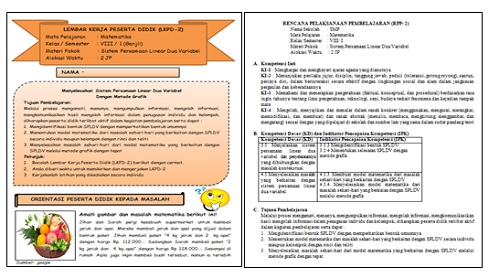
Development of a Problem Based Learning Media to Build Mathematical Communication Capabilities Students of Class VIII Junior High School
Abstract
Keywords
Full Text:
PDFReferences
Akbar, S. (2013). Instrumen Prangkat Pembelajaran. Bandung: PT. Remaja Rosdakarya.
Amri, S. (2013). Pengembangan dan Model Pembelajaran dalam Kurikulum 2013. Jakarta: Prestasi Pustaka.
Atika, N., Roza, Y., & Murni, A. (2020). Pengembangan Perangkat Pembelajaran Dengan Model Pembelajaran Berbasis Masalah untuk Meningkatkan Kemampuan Komunikasi Matematis. Journal of Educational Sciences, 4(1), 67-72.
Choridah, D. (2013). Peran Pembelajaran Berbasis Masalah untuk Meningkatkan Kemampuan Komunikasi dan Berpikir Kreatif serta Disposisi Matematis Siswa SMA. Jurnal Ilmiah Program Studi Matematika Stkip Siliwangi Bandung, 2(2), 200.
Duskri, M., Maidiyah, E., Risnawati., & Ilham, S. (2017). Penerapan Model Problem Based Learning Untuk Meningkatkan Kemampuan Komunikasi Matematis Dalam Pemecahan Masalah Di Kelas IX-6 SMPN 8 Banda Aceh. Al-Khawarizmi : Jurnal Pendidikan dan Pembelajaran Matematika, 1(1), 75-101
Mulyatiningsih, E. (2014). Metode Penelitian Terapan Bidang Pendidikan. Bandung: Alfabeta.
Fitratul, W. (2017). Pengembangan Perangkat Pembelajaran Berbasis Masalah Berorientasi pada Kemampuan Komunikasi dan Prestasi Belajar Matematika Siswa SMP. Jurnal Riset Pendidikan Matematika, 4 (1), 32-42.
Hobri. (2010). Metode Penelitian Pengembangan (Aplikasi pada penelitian Pendidikan Matematika). Jember: Pena Salsabila.
Karunia, P., Maimunah., & Murni, A. (2019). Development of ICT-Based Mathematical Media on Linear Program Materials to Improve Motivation Learning Students. Journal of Educational Sciences, 3(2), 19-204.
Kodariyati, L., & Astuti, B. (2016). Pengaruh Model PBL Terhadap Kemampuan Komunikasi dan Pemecahan Masalah Matematika Siswa Kelas V SD. Jurnal Prima Edukasia, 4(1). 93-106.
Novrini, P., & Edy, S. (2015). Pengembangan Perangkat Pembelajaran Berorientasi Problem Based Learning Untuk Meningkatkan Kemampuan Visual Thinking Dalam Pemecahan Masalah Matematis Siswa Kelas VIII SMP. Jurnal Paradigma, 8(3), 84-97.
Sugiono. (2013). Metode Penelitian Kuantitatif, Kualitatif, dan R&D. Bandung: Alfabeta.
Sumarno., & Dhoriva, U. W. (2014). Pengembangan Perangkat Pembelajaran pada Materi Pokok Kalkulus SMA Kelas XI Semester 2. Jurnal Riset Pendidikan Matematika, 1(2), 257-267.
Wardani, V. W., & Merona, S. P. (2016). Implementasi Model Pembelajaran Berbasis Masalah Untuk Meningkatkan Komunikasi Matematis Siswa. Jurnal Silogisme: Kajian Ilmu Matematika dan Pembelajarannya, 1(2), 34-40.
DOI: http://dx.doi.org/10.31258/jes.4.3.p.487-500
Refbacks
- There are currently no refbacks.
Copyright (c) 2020 Hany Zahira, Zulkarnain Zulkarnain, Putri Yuanita

This work is licensed under a Creative Commons Attribution 4.0 International License.
Publisher: FKIP Universitas Riau












